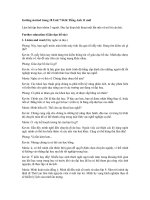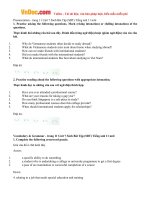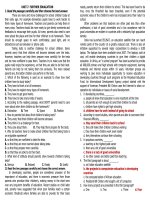Unit 7 further education
Bạn đang xem bản rút gọn của tài liệu. Xem và tải ngay bản đầy đủ của tài liệu tại đây (334.35 KB, 11 trang )
UNIT 7: FURTHER EDUCATION
(GIÁO DỤC NGHỀ)
A. VOCABULARY
New words
academic
/ˌækəˈdemɪk/
(adj)
Meaning
thuộc về hoặc liên
quan đến giáo dục,
việc học tập, mang
tính học thuật
Example
Picture
Students nowadays have many
opportunities to develop their
talents in both academic and
non-academic areas.
Học sinh ngày nay có nhiều cơ
hội phát triển tài năng trong cả
các lĩnh vực học thuật và phi học
thuật.
accommodation
phòng ở, chỗ ở
/əˌkɒməˈdeɪʃn/
(n)
You
should seek out some
information on accommodation
in the area before you study
abroad.
Bạn nên tìm hiểu thơng tin về chỗ
ở trong khu vực đó trước khi đi du
học.
admission
/ədˈmɪʃn/ (n)
analytical
sự vào hoặc được
nhận vào một
trường học
prestigious university.
(thuộc) phân tích
Higher education students need
/ˌỉnəˈlɪtɪkl/ (adj)
He
gained
admission
to
a
Anh ấy đã được nhận vào một
trường đại học danh tiếng
to have analytical skills.
Sinh viên đại học cần có các kỹ
năng phân tích.
baccalaureate
kì thi tú tài
/ˌbỉkəˈlɔːriət/ (n)
I am taking my baccalaureate
tomorrow.
Ngày mai, tơi sẽ tham gia kỳ thi tú
tài.
bachelor
người có bằng
I graduated from university
/ˈbỉtʃələ(r)/ (n)
cử nhân
with an excellent bachelor's
degree.
Tơi tốt nghiệp đợi học với bằng cử
nhân xuất sắc.
campus
/ˈkæmpəs/ (n)
collaboration
khu trường sở, sân
bãi
(của
các
trường trung học,
đại học)
students.
sự cộng tác
To
/kəˌlỉbəˈreɪʃn/
(n)
We don't need campus-based
Chúng ta khơng cần sinh viên học
tại trường.
get
good
outcomes,
educational
there
must
be
collaboration between teachers
and students.
Để có kết quả giáo dục tốt, cần
phải có sự hợp tác giữa giáo viên
và học sinh
coordinator
/kəʊˈɔːdɪneɪtə(r)/
(n)
critical
/ˈkrɪtɪkl/ (adj)
người điều phối,
điều phối viên
The organization needs a good
coordinator.
Tổ chức cần một điều phối viên
giỏi.
thuộc bình phẩm,
phê bình
Students should be encouraged
to develop critical thinking.
Nên khuyến khích học sinh phát
triển tư duy phản biện.
CV
/ˌsiː ˈviː/ (n)
dean
/diːn/ (n)
viết
tắt
của
curriculum vitae,
bản tóm tắt q
trình hoạt động
của một người
(thường nộp theo
đơn xin việc); bản
lí lịch
You should send a full cv with
chủ nhiệm khoa
(một trường đại
học)
She was appointed dean of the
your job application as soon as
possible.
Bạn nên gửi một bản sơ yếu lý
lịch đầy đủ cùng đơn xin việc
càng sớm càng tốt.
faculty
of
English
at
this
university.
Cô ấy được bổ nhiệm chức chủ
nhiệm khoa Tiếng Anh tại trường
đại học này.
degree
/dɪˈɡriː/ (n)
bằng cấp
After high school, I will decide
whether I want to pursue an
undergraduate degree or not.
Sau khi tốt nghiệp cấp ba, tôi sẽ
quyết định xem tơi có muốn học
đại học hay khơng.
enroll
ghi danh, đăng ký
/ɪnˈrəʊl/ (v)
You should enroll in this course
to improve your English skills.
Bạn nên đăng ký khóa học này để
cải thiện kỹ năng tiếng Anh của
mình.
diploma
/dɪˈpləʊmə/ (n)
bằng
bằng
cấp,
văn
She
is
taking
a
two-year
diploma course.
Cơ ấy đang học một khóa học văn
bằng kéo dài hai năm.
doctorate
học vị tiến sĩ
/ˈdɒktərət/ (n)
eligible
/ˈelɪdʒəbl/ (adj)
I'm studying for my doctorate.
Tôi đang học tiến sĩ.
đủ tư cách, thích
hợp
You are eligible to apply for this
job
Bạn đủ năng lực để ứng tuyển cho
công việc này.
institution
/ˌɪnstɪˈtjuːʃn/ (n)
viện, trường đại
học
You should ask the institution
you are applying to which
version is required.
Bạn nên hỏi trường đại học mà
bạn đang ứng tuyển xem phiên
bản nào là bắt buộc.
internship
/ˈɪntɜːnʃɪp/ (n)
giai đoạn thực tập
My medical internship lasts 3
months in this hospital.
Kỳ thực tập y khoa của tôi kéo dài
ba tháng tại bệnh viện này.
major
/ˈmeɪdʒə(r)/ (n)
mơn học chính của
sinh viên, chun
ngành
My major is English.
Chun ngành của tơi là tiếng
Anh.
mandatory
có tính bắt buộc
English is a mandatory subject
/ˈmỉndətəri/ (adj)
in this school.
Tiếng Anh là mơn học bắt buộc ở
trường này.
master
thạc sĩ
I
/ˈmɑːstə(r)/ (n)
decided
to
pursue
postgraduate education to get a
master's degree. Tôi quyết định
theo đuổi đào tạo sau đại học để
lấy bằng thạc sĩ.
potential
/pəˈtenʃl/ (n)
khả năng,
năng
tiềm
I think this is a chance for me to
realize my potential.
Tôi nghĩ đây là cơ hội để tơi nhận
ra tiềm năng của mình.
qualification
/ˌkwɒlɪfɪˈkeɪʃn/
(n)
văn bằng, học vị,
chứng chỉ
Many people decide to study
overseas
to
gain
higher
academic qualifications.
Nhiều người quyết định đi du học
để lấy các học vị cao hơn.
scholarship
học bổng
/ˈskɒləʃɪp/ (n)
You should apply for
scholarship to study abroad.
Bạn nên xin học bổng du học.
transcript
/ˈtrænskrɪpt/ (n)
học bạ, phiếu điểm
I will get a transcript of marks
for all subjects after finishing
school.
Tôi sẽ nhận được bảng điểm tất cả
các môn sau khi tốt nghiệp.
undergraduate
/ˌʌndəˈɡrædʒuət/
(n)
sinh viên đang học
đại học hoặc cao
đẳng, chưa tốt
nghiệp
Undergraduate students can do
part time jobs to gain practical
experience.
Sinh viên đại học có thể làm việc
bán thời gian để lấy kình nghiệm
thực tế.
vocational
thuộc về hoặc liên
/vəʊˈkeɪʃənl/ (adj) quan đến học
nghề,
hướng
nghiệp
Students
should
take
a
vocational course if they need
practical skills and want to
prepare for a job.
Học sinh nên tham gia một khóa
học nghề nếu cấn kỹ năng thực tế
và muốn chuẩn bị đi làm.
B. GRAMMAR
I. THE PRESENT PERFECT CONTINUOUS (HIỆN TẠI HOÀN THÀNH TIẾP DIỄN)
1. Cấu trúc (Form)
Affirmative (Khẳng định)
S + have/ has + been + V-ing
She has been waiting here for 30
minutes.
Negative (Phủ định)
S + have/ has + not + been + Ving
She hasn't been waiting here for
30 minutes.
Interrogative (Nghi van)
Have/ Has + S + been + v-ing...?
Has she been waiting here for 30
minutes?
2. Cách dùng (use)
Thì hiện tại hồn thành tiếp diễn được dùng để diễn tả:
- Hành động bắt đầu trong quá khứ, kéo dài liên tục đến hiện tại, vẫn đang tiếp tục ở hiện tại. Cách dùng
này thường đi kèm với giới từ "since" và "for"
E.g: They have been waiting here for over two hours. (They are still waiting here now.)
I have been reading for 3 hours. (I am still reading now.)
How long have you been learning English? (You are still learning now.)
- Hành động đã bắt đầu trong quá khứ, vừa mới kết thúc gần đây.
E.g: Why is the grass wet? Has it been raining?
I'm tired because I've been running.
3. Signal Words
Một số cụm từ thường đi kèm trong thì hiện tại hồn thành tiếp diễn như: all day, for 4 years, since 1993,
how long, the whole week, ...
4. Sự khác biệt giữa hiện tại hồn thành và hiên tại hồn thành tiếp diễn
- Thì hiện tại hoàn thành chú ý đến kết quả của hành động.Trong khi đó, thì hiện tại hồn thành tiếp diễn
nhấn mạnh đến hành động mà có thể chưa kết thúc.
E.g: I've been decorating the house this morning. (nhấn mạnh vào hành động -decorating- hành động
chưa kết thúc)
I've painted the living room blue. (nhấn mạnh vào kết quả của hành động. Bây giờ chúng ta có thể nhìn
thấy được kết quả)
- Thì hiện tại hồn thành nói đến hành động hồn thành được bao nhiêu (how many/ how much); cịn thì
hiện tại hồn thành tiếp diễn nói đến hành động xảy ra được bao lâu (how long)
E.g: She's been writing letters for 3 hours.
She's written 5 letters.
- Thì hiện tại hồn thành nói đến hành động mang tính chất lâu dài, cịn thì hiện tại hồn thành tiếp diễn chỉ
hành động mang tính tạm thời.
E.g: I've worked here for ten years.
I usually work in Hanoi but I've been working in Ho Chi Minh City for the last 3 weeks.
Lưu ý: Trong một số trường hợp, ta có thể chia động từ ở cả thì hiện tại hồn thành và hiện tại hoàn
thành tiếp diễn tùy thuộc vào ngữ cảnh.
■ BÀI TẬP VẬN DỤNG Cơ BẢN
Bài 1: Put the verbs into the correct form (present perfect continuous).
1. He
2. I
3. Mary
(work) in this company since 1995.
(wait) for you since two o'clock.
(live) in Germany since 1990.
4. Why is he so tired? He
5. How long
6. We
7. I
(you, learn) English?
(look for) the motorway for more than an hour.
(live) without electricity for two weeks.
8. The film
(not run) for ten minutes yet, but there's a commercial break already.
9. How long
10. She
(play) tennis for five hours.
(she, work) in the garden?
(not / be) in the garden for more than an hour.
Bài 2: Make sentences using the present perfect continuous.
1. (I / not/work today)
⇒
2. (you / not / eat well recently)
⇒
3. (we/not/exercise enough)
⇒
4. (she / not / study)
⇒
5. (they/ not/ live here for a long time)
⇒
6. (it / not / snow)
⇒
7. (he / not / play football for five years)
⇒
8. we / not / drink enough water - that's why we feel tired)
⇒
9. (I/ not/ sleep - I was reading)
⇒
10. (they / not / watch TV much recently)
⇒
Bài 3: Choose the best answer.
1. How long
for?
A. are you waiting
B. have you been waiting
C. have you waited
D. do you wait
2. We
in this street for twenty years.
A. are living
B. have been living
C. live
D. lived
3. He
in the garden since morning.
A. is working
B. work
C. worked
D. has been working
4. It
heavily yesterday.
A. is raining
B. has rained
C. rained
D. has been raining
5. I
this laptop for three vears.
A. am using
6. The workers
B. use
C. have been using
higher wages for a long time.
A. has been demanding
B. have been demanding
C. demand
D. demanded
7. The girl
her lessons for 2 hours.
A. has been learning
B. have been learning
C. had been learning
D. is learning
8. The children
A. has been playing
in the garden now.
B. have been playing
D. used
C. had been playing
D. are playing
9. "You look tired". "Yes, I
"
A. am running
B. have been running
C. has been running
D. was running
10. Who
in my bed since 7 o'clock?
A. is sleeping
B. has been sleeping
C. have been sleeping
D. was sleeping
Bài 4: Choose the best answer.
1. I've (been writing/ written)
to the bank twice, but I haven't had a reply.
2. We've (painted/ been painting)
the bedroom. We've nearly finished.
3. They've (been knowing/ known)
each other for ten years.
4. Have you (been seeing/ seen)
the new James Bond film yet?
5. I've (been trying/ tried)
to call you all morning!
6. How long have you (been waiting/ waited)
7. We've (been having/ had)
for the bus?
a dog for ten years.
8. I haven't (been working/ worked)
hard recently.
Bài 5: Put the verbs into the correct form, using either the Present Perfect or the Present Perfect
continuous.
1. How long
Jerry? (you/to know)
2. You look dirty. What
all day? (you/to do)
3. How many times
4. She
New York? (Michael/to visit)
French words for hours, but she still doesn't remember all of them, (to learn)
5. The children
6.
videos for two hours, (to watch)
hard today? (he/to study)
7. My father
. (never/to smoke)
8. Sorry, I'm late.
for long? (you/to wait)
9. We
Lisa recently, (not/to see)
10. He
his essay all day, but he
yet. (to write) (not/to finish)
Bài 6: Put the verbs into the correct form, using either the Present Continuous or the Present
Perfect continuous.
1.
It (rain)
2.
You look really great! (You, exercise)
3.
Mark, where have you been? We (wait)
4.
Tim: What is that sound?
Daisy: A car alarm (ring)
wish it would stop! it (ring)
than twenty minutes.
all week. I hope it stops by Friday because I want to go to the beach.
at the fitness center?
for you since 1 p.m.
somewhere down the street. It(drive)
for more
me crazy - I
5. Johnson's English (improve, really)
, isn't it? He (watch)
American television programs every day since he first arrived in San Diego. Soon he will be totally
fluent.
6.
Dave: You look a little tired. (You, get)
Michelle: Yes, I (sleep)
enough sleep lately?
relatively well. I just look tired because I (feel)
a little sick for the last week.
Dave: I hope you feel better soon.
Michelle: Thanks. I (take, currently;
days.
some medicine, so I should feel better in a couple of
Bài 7: Put the verbs into the correct form, using either the Present Perfect or the Present Perfect
continuous.
1. Julia: How long (you, be) ;n Canada?
Clare: I (study)
here for more than three years.
2. I (have)
the same car for mere than ten years. I'm thinking about buying a new one.
3. I (love)
chocolate since I was a child. You might even call me a "chocoholic."
4. Mark and Sarah (have)
some difficulties in their relationship lately, so they (go)
to a marriage counselor. I hope they work everything out.
5. John (work)
for the government since he graduated from Harvard
University. Until recently, he (enjoy)
his work, but now he is talking about retiring.
6. Lately, I (think)
about changing my career because I (become)
with the conditions at my company
7. I (see)
Julia for more than five years and during that time I (see)
changes in her personality.
■ BÀI TẬP TỔNG HỢP NÂNG CAO
Bài 8: Choose the correct form (Present Perfect Simple or Present Perfect continuous).
1. We want to tell how we have spent our time:
A. We have played football.
B. We have been playing football.
2. The action is completed now:
A. Charles has sent the letter.
B. Charles has been sending the letter.
3. I want to tell how I have spent my time:
A. I have watched TV.
B. I have been watching TV.
4. I want to emphasise that the door is open now:
A. Elizabeth has opened the door.
B. Elizabeth has been opening the door.
5. I want to emphasise that the house is ready now:
A. My friends have built a house.
dissatisfied
many
B. My friends have been building a house.
Bài 9: Put the verbs into the correct form, using either the Present Perfect or the Present Perfect
continuous.
1. I (play)
football for five years.
2. My team (win / only)
two matches so far.
3. The others (be I always) _better.
4. Are we not there yet? We (walk)
5. But we (cover / only)
an area of five miles so far.
6. I (finish/just)
7. I (work)
for hours.
my homework.
on this essay since two o'clock.
8. Jane (go out)
9. Peter (date)
with Bob for seven years.
three girls this week.
10. How long (wait / you)
for us?
Bài 10: Put the verbs into the correct tense (Present Perfect or Present Perfect Continuous).
1. A: (you / take)
2. B: I (work)
I (have I not)
the dog for a walk yet?
all day. I (come / just)
home from work and
the time yet to walk the dog.
3. A: How long (the dog / be)
home alone?
4. B: For about 6 hours. You (walk I not)
5. A: Well, I (laze / not)
tomorrow and I still (finish / not)
the dog for a long time. Don't you want to go?
about all day either, you know. I have a very important meeting
my report.
6. B: Okay, I will go then. Where (you / put)
collar and leash?
7. A: They are in the kitchen. By the way, (you I eat)
something from the market?
anything yet? If not, could you get us
Bài 11: Put these words into the correct order to make sentences with present perfect continuous.
1. morning / cleaning I these / been I dirty /. / all / I've I floors
⇒
2. three I office / for / has / Sarah / this /. / in / been / weeks I working
⇒
3. to I been / how / bus / long I this / ?/ waiting / we / come / have I for
⇒
4. been / hour./ we've /1 / understand I don't / and I document I reading / for / this I anything /an
⇒
5. I very / long I haven't / they / for / French / been / learning
⇒
6. weeks / been / with / sister / few /. / his / a / Martin / living I for I has
⇒
7. five I you / ? / have I been / doing / these I years / last / what
⇒
8. these / cleaning / all / you / do / been / ? / I've / know / glasses / why
⇒
Bài 12: Put the verbs into either the Present Perfect or Present Perfect Continuous.
1. I'm really tired. I
2. Peter
since seven this morning, (work)
at six schools in six years. He never stays in the same job. (teach)
3. Mr Hung
since she left university in 2000. (teach)
4. Hoa
English for nearly two years, (study)
5. This week he
6. I
ten new verbs, (learn)
over 40 resumes but I still can't decide who to give the job to. (read)
7. She can't still be thirsty! She
8. How long
9. How many games
three glasses of lemonade, (drink)
professional baseball? (play)
? (play)









